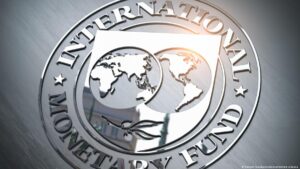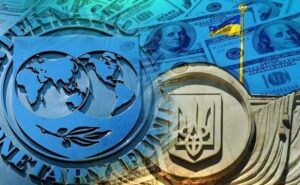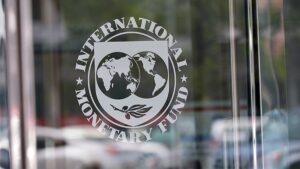
The International Monetary Fund (IMF) has worsened its forecast for real gross domestic product (GDP) growth for this year from 3-4% to 2.5-3.5% at the end of the fourth review of the EFF extended financing program, while improving its year-end inflation forecast from 8.5% to 8%.
“We are now seeing clear signs of a slowdown in growth due to deteriorating sentiment as military action develops and also due to power outages,” Gavin Gray, head of the International Monetary Fund (IMF) mission to Ukraine, said at a press conference on Friday evening after Ukraine’s tranche was disbursed.
Risks remain exceptionally high, he said, especially due to uncertainties related to the war and external financing.
According to a publication on the Fund’s website, for next year, expectations for Ukrainian economic growth have been worsened to 5.5% from 6.5%, while maintaining the inflation estimate of 7%.
The IMF also lowered its forecast of Ukraine’s nominal GDP for this year to UAH 7.49 trillion from UAH 7.75 trillion in its March review, and for next year to UAH 8.74 trillion from UAH 8.87 trillion.
In terms of GDP composition, the IMF slightly worsened expectations for net exports, while expecting a larger contribution from domestic demand, private consumption and investment compared to the March revision.
The Fund improved the inflation forecast for the end of this year to 8% from 8.5%, maintaining its expectations for its slowdown to 7%, 5.5% and 5% in 2025-2027, but lowered expectations for real income growth this year and next year: by 1.2 p.p. to 8.6% and by 1 p.p., respectively. – to 8.6% and by 1 p.p. to 6.8%. – to 6.8%.
Also, the fourth revision slightly worsened the unemployment estimate: to 14.8% from 14.5% this year and to 14.3% instead of 13.8% next year.
As for the budget, the IMF has increased the estimate of its deficit (excluding grants) – to 20.9% of GDP from 20.2% of GDP for this year, to 10.4% of GDP from 10.3% of GDP for 2025.
According to the document, expectations for external financing have been improved to 12.1% of GDP from 11.8% of GDP and domestic financing to 2.1% of GDP from 2% of GDP, which should be provided by banks, while the estimate of external financing for next year remained at 6.5% of GDP, domestic – 0.9% of GDP with a reduction in the participation of banks to 0.5% of GDP.
As reported, last year the Ukrainian economy, according to the State Statistics Committee, grew by 5.3% after falling by 28.8% a year earlier, and in the first quarter of this year growth amounted to 6.5%.
On April 25 this year, the NBU worsened the country’s GDP growth forecast for this year from 3.6% to 3%.
The government, when approving the draft state budget for the second reading in early November 2023, projected economic growth this year at 4.6%, but the Finance Ministry recently said it had been worsened to 3.5%, and First Deputy Prime Minister Yulia Sviridenko said in mid-June in Berlin that the forecast had been worsened to less than 4%.

The Ministry of Finance and the National Bank of Ukraine, after reaching a staff-level agreement (SLA) with the IMF on the fourth review of the Extended Fund Facility (EFF) program, expect it to be approved by the IMF Board of Directors and the disbursement of the fifth tranche of the $2.2 billion program in the coming weeks.
“Ukraine has never reached the fourth review in any IMF program before. Today’s agreements are evidence of our commitment to reforms and changes for our country (…),” Prime Minister Denys Shmyhal commented on the agreement.
Minister of Finance Sergii Marchenko said that the government continues to work on implementing reforms and prioritizes maintaining economic stability and restoring Ukraine’s path to EU membership. He also thanked the IMF team for their efficient and well-coordinated cooperation.
According to the Ministry of Finance, the IMF experts emphasized the importance of the National Revenue Strategy and the implementation of certain of its provisions.
“The National Revenue Strategy is one of the structural beacons of the EFF-IF-U Program, which provides for the gradual implementation of measures aimed at reforming fiscal authorities and mobilizing tax revenues, as well as measures aimed at strengthening public confidence in tax and customs authorities,” the Ministry reminded.
For its part, the NBU noted that the future priorities of cooperation with the Fund will include strengthening banking regulation, supervision, lending, and capital market infrastructure.
In addition, considerable attention will be paid to increasing the level of financial inclusion, especially in the de-occupied territories and in regions close to active hostilities.
“Its low level is a deterrent to economic activity, so the NBU will focus on diagnostic work involving IMF and World Bank experts to develop effective measures,” the regulator said on its website on Friday evening.
The NBU is ready to further ease monetary policy provided that inflation expectations remain stable and hryvnia instruments remain attractive, which will be supported by a flexible exchange rate, the regulator said.
“Further balanced and gradual easing of currency restrictions in accordance with the Strategy should support economic recovery without creating risks to macrofinancial stability,” the NBU said in a statement.
According to the NBU, IMF experts noted that budget financing needs in 2024 remain very high. Given this, budget implementation should take into account financial constraints and the need to restore fiscal and debt sustainability.
“To ensure fiscal sustainability, Ukraine needs to accelerate the implementation of tax reforms and revenue administration envisaged by the National Revenue Strategy,” the press release says.
Among the priorities of the Program implementation, the regulator noted the strengthening of tax and customs administration, as well as strengthening public confidence through anti-corruption reforms and measures to properly protect taxpayers’ personal data.

The International Monetary Fund (IMF) has clarified the forecast of Ukraine’s GDP growth in 2024 under the World Economic Outlook (WEO): it expects it at the level of 3.2%, then during the third revision of the EFF Extended Fund Facility program in March estimated it in the range of 3-4%.
According to a publication on the Fund’s website on Tuesday, the economic growth forecast for 2025 was kept at 6.5%, up from 5.3% in 2023, according to the State Statistics Service.
The IMF also expects average annual inflation to slow to 6.4% this year from 12.9% last year and accelerate slightly to 7.6% in 2025.
Ukraine’s current account deficit forecast for this year and next year has been kept at the same level as in the third revision of the EFF program – 5.7% of GDP and 8.2% of GDP after 5.5% of GDP last year.
The Fund also reiterated expectations for unemployment to fall from 19.1% last year to 14.5% this year and 13.8% next year/
The IMF indicated that it forecast growth in the euro zone to accelerate to 0.8% this year and 1.5% next year after 0.4% last year, driven by the strong impact of Russia’s war against Ukraine.
“Stronger household consumption as the impact of the energy price shock fades and lower inflation supports real income growth is expected to support the recovery,” the Fund said, clarifying that the updated estimate is 0.1-0.2 percentage points (p.p.) worse than the previous estimate made in January.
Overall, the WEO said global economic growth, estimated at 3.2% in 2023, will continue at the same pace in 2024 and 2025. The forecast for 2024 is revised upward by 0.1pc from the January estimate.
“These growth rates are low by historical standards, driven by both short-term factors, such as continued high borrowing costs and the withdrawal of fiscal support, and the longer-term effects of the COVID-19 pandemic and Russia’s invasion of Ukraine, weak productivity growth, and increased geoeconomic fragmentation,” the IMF said.
Overall global inflation is expected to decline from an annual average of 6.8% in 2023 to 5.9% in 2024 and 4.5% in 2025, with advanced economies returning to their inflation targets sooner than emerging market and developing countries.
The report also notes that the forecast for global economic growth in five years’ time (at 3.1%) is the lowest in decades. ” An alarming change is the widening gap between many low-income countries and the rest of the world. The growth forecast for these economies has been revised downward and the inflation forecast has been raised,” the Fund states.
Worse still, the report notes that compared to most other regions, estimates of long-term damage for low-income developing countries, including some large countries, are revised upward, indicating that the poorest countries are still unable to recover from the pandemic and cost-of-living crisis.
Its experts attribute the relatively weak medium-term outlook to lower GDP per capita growth, due in part to persistent structural frictions preventing the movement of capital and labor to productive firms. And worsening growth prospects in China and other large emerging market economies, given their growing share in the global economy, will have a negative impact on the development prospects of their trading partners.
According to the IMF, the risks to the global economic outlook are currently balanced. “On the downside, new price spikes triggered by geopolitical tensions, including from the war in Ukraine and the conflict in Gaza and Israel, could, along with the resilience of core inflation while labor markets remain tight, lead to higher interest rate expectations and lower asset prices,” the WEO pointed out.
The fund added that geo-economic fragmentation could intensify, with higher barriers to the flow of goods, capital and people implying slower economic growth due to lower supply.
At the same time, it noted that artificial intelligence and stronger structural reforms than expected could boost productivity growth.
As the global economy approaches a soft landing, the priority for central banks in the short term is to ensure that inflation falls smoothly, avoiding both premature policy easing and excessive delay leading to lagging behind targets, the IMF also said.
“Multilateral cooperation is needed to limit the costs and risks associated with geoeconomic fragmentation and climate change, accelerate the transition to green energy, and facilitate debt restructuring,” the Fund concluded.
More details on macroeconomic indicators of Ukraine and the world, GDP of major countries and other economic topics were discussed in one of the video analysis of Experts club analytical center – https://youtu.be/w5fF_GYyrIc?si=Ymo-FlMFNGfLLdK-.
Subscribe to Experts club channel here: https://www.youtube.com/@ExpertsClub
EXPERTS CLUB, GDP GROWTH, IMF, MACROECONOMICS, UKRAINE, URAKIN

The International Monetary Fund (IMF), following the third revision of Ukraine’s EFF Extended Fund Facility program, still considers the baseline scenario as the end of active hostilities in 2024, however, in the updated negative scenario, where the assumption of a more intense war that will last into 2025 remains, the Fund has slightly improved the macro outlook.
“Assuming that the shock starts in the second quarter of 2024, the contraction of the economy reaches 4% in 2024, compared to growth of 3-4% in the baseline scenario. A longer and more intense war is expected to have a significant impact on economic sentiment, the rate of return of migrants, fiscal spending needs, and export capacity,” the IMF said in a submission published on its website.
According to its estimates, inflation in 2024 in such a negative scenario will also be higher – 10% compared to 8.5% in the baseline scenario.
At the same time, last December, after the second revision of the program, the IMF in the negative scenario for 2024 expected a decline in GDP by 5% with inflation of 11%.
As for 2025, the forecast of GDP growth and inflation in the negative scenario was kept at the same level – 0% and 8.5%, respectively, while in the baseline scenario the Fund expects economic growth of 6.5% with inflation of 7%.
In addition, the updated negative scenario significantly improved the estimate of the trade deficit for this year – by $5.8 bln to $33.1 bln ($28.7 bln in the base case), respectively, the NBU reserves will be reduced to $34.4 bln ($42.1 bln in the base case), not $32.4 bln, as expected in December.
In addition, the forecast of the state budget deficit has been raised by 1.4 percentage points (p.p.) to 17.6% of GDP (13.7% of GDP in the base case), while the estimate of the state debt has been reduced by 5.5 p.p.. – to 105.9% of GDP (94% of GDP in the base case).
“Given the reserve holdings, some intervention is expected to prevent excessive exchange rate volatility and inflation carryover. Unlike in the baseline scenario, in the downside scenario, inflation will take longer to return to the target level,” the materials said.
According to them, the estimate of the increase in donor funding compared to the baseline scenario was left unchanged at $140.6 billion versus $121.8 billion in the baseline scenario.
“If the severity of shocks takes the country beyond the downside scenario, additional measures may be required, and the authorities have the commitment and capacity to implement them. Repeated shocks beyond the downside scenario could force the authorities to take temporary unconventional measures,” the Fund also pointed out.
Depending on the size of the financing need, according to IMF experts, extraordinary measures that could further raise revenues (e.g. a solidarity tax as a complement to the personal income tax, and/or an additional tax on luxury goods, or excise taxes/levies) and mobilization of domestic bond financing on an even larger scale, as well as monetary financing within program parameters, may be needed. “The latter could include, if necessary, administrative measures requiring banks to hold government securities at a set amount or with a minimum holding period, possibly differentiating banks according to individual liquidity conditions. Secondary purchases of government bonds by the NBU could also support the primary market,” the Fund explained.
Instruments such as inflation- or exchange rate-linked bonds could also be considered, he said.
In addition, says MF, while the scope for fiscal tightening is limited, it will have to be considered as well, as ultimately spending in some categories depends on the inflow of external financing.
“Overall, the extensive discussions with the authorities on contingency plans during the Third Review reaffirm that the program remains credible even in the event of such a negative scenario. The authorities’ political commitment and track record, as well as renewed financial guarantees from international partners and expected debt relief, give confidence that even in this updated deterioration scenario, the program’s objectives of maintaining macroeconomic and financial stability and restoring debt sustainability in the future will be achieved,” the Fund concluded, noting that the authorities are prepared to take appropriate policy measures if necessary.
It is specified that in the fiscal sphere, the bulk of the adjustment will be done through fiscal measures that can be effectively and quickly implemented to increase revenues, while some expenditures should be made contingent on available financing.
“Temporary pressure on the managed floating exchange rate regime under the negative scenario may require the reintroduction of some of the exchange controls used earlier during the war,” the IMF also noted.
The materials note that the risks to both forecasts – both basic and negative – remain extremely significant and continue to develop against the background of prevailing uncertainty. Among the main risks, the Fund categorized the risks associated with a serious shortfall in external financing and/or the impact of a more intense and prolonged war. It is explained that shortages or prolonged delays in donor funding could require the authorities to take swift countermeasures to overcome liquidity pressures, which could weaken confidence and further dampen growth, and be potentially destabilizing if uncertainty lasts too long.
Whereas, as the war continues, defense spending needs could increase significantly due to mobilization and increased intensity of hostilities, which could negatively affect confidence and lead to financing gaps.
“In the event of serious negative shocks, the authorities may resort to suboptimal measures (e.g., accumulation of budgetary arrears and cuts in social spending). The negative sentiment that may arise from this could lead to social unrest,” indicated another IMF risk.
It is emphasized that the 2025 budget will need to take into account continued risks and allow for greater Ukrainian autonomy to meet priority expenditures. “While the baseline scenario expects the war to end by the end of 2024, significant needs for defense, reconstruction, social protection, and economic development are likely to remain. At the same time, external budgetary support, while still substantial, is expected to decline sharply. Thus, additional efforts to increase revenues will be required,” the Fund noted.
According to the updated program, while in 2023 external financing amounted to $42.5 billion, and this year it is projected at $38.1 billion, next year it is expected to drop to $22.9 billion.
Earlier, the Experts Club think tank released a video on how countries’ GDPs have been changing in recent years, more video analysis is available here –

Ukraine has fulfilled all obligations for the third revision of the EFF extended financing program and expects a positive decision by the Executive Board of the International Monetary Fund (IMF) on the allocation of the fourth tranche of about $900 million in the near future, Finance Minister Serhiy Marchenko said.
“We are expecting a meeting of the board of the International Monetary Fund in the near future. It seems to me that the date of such a meeting is planned for March 21, at which a decision on Ukraine will be made,” he said on the national telethon.
According to Marchenko, these funds will be received immediately after a successful discussion at the Executive Board.
“So far we are fulfilling all our obligations. And I don’t see any particular problems for us to continue to fulfill these obligations in 2024,” the Minister of Finance emphasized, predicting further cooperation with the IMF under the EFF program.
He also noted that Ukraine still considers the basic option of receiving direct budget support from the United States this year, about which it receives constant assurances from the American side.
“We hope that a solution will be found in the lower house (of the U.S. Congress). There is now every reason for this. We hope that direct budget support will continue, this is important for cooperation with the IMF, for forming a pool of partners,” Marchenko said.

Ukraine is close to reaching a deal with the International Monetary Fund to receive the next $900 million disbursement of its $15.6 billion loan, a boost to the war-torn country’s budget and a vote of confidence as U.S. aid remains fragile, Bloomberg reported Wednesday.
According to the agency, Ukraine expects to reach an agreement with IMF staff as early as Thursday, according to officials with knowledge of the talks who asked not to be identified because the deal is not yet finalized. The agreement must be ratified by the IMF’s executive board, which is almost always done without problems.
A team of IMF staff led by IMF Chief of Mission Gavin Gray, which has been assessing whether Ukraine has met the conditions for the loan, is to complete its work and make a statement Thursday in Washington, officials said. According to one of the officials, it may take several more days to finalize the agreement at the staff level, Bloomberg reports.
As reported earlier, the IMF mission and Ukrainian authorities held talks in Warsaw and online on the third revision of the EFF Extended Fund Facility program. The four-year EFF program was approved on March 31, 2023. The first tranche of USD 2.7 billion was disbursed in early April, the second and third tranches of SDR 664 million (approximately USD 881-890 million at the then exchange rate) in early July and mid-December.
The program’s planned schedule provides for the disbursement of another tranche to Ukraine at the end of February 2024 based on the results of the third review, when the fulfillment of obligations as of the end of December 2023 is assessed. Three more tranches are envisaged for 2024: SDR1.670 billion ($2.226 billion) in mid-June, followed by SDR835 million ($1,113 million) in early September and December. Two tranches are planned for 2025: SDR684 million ($912 million) in early March and late August, followed by the last three tranches of SDR966 million ($1.288 billion).